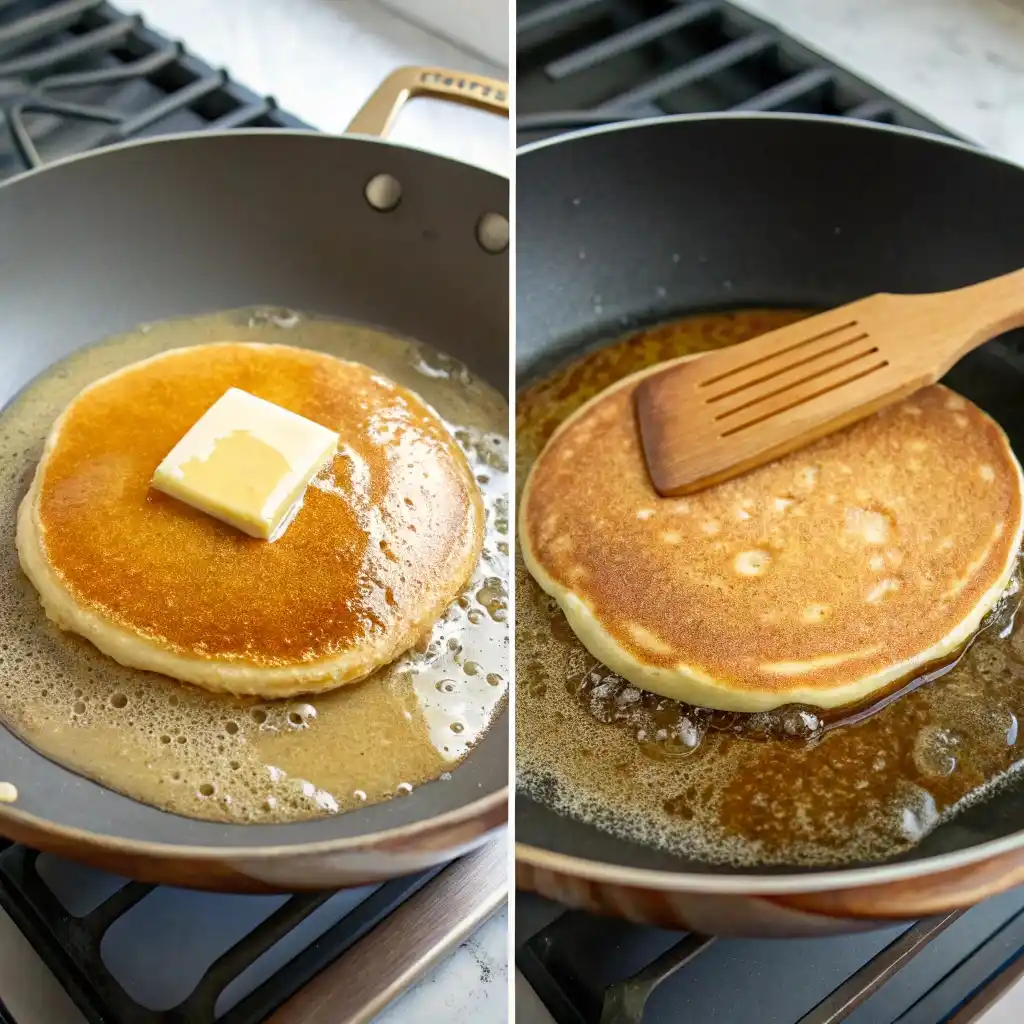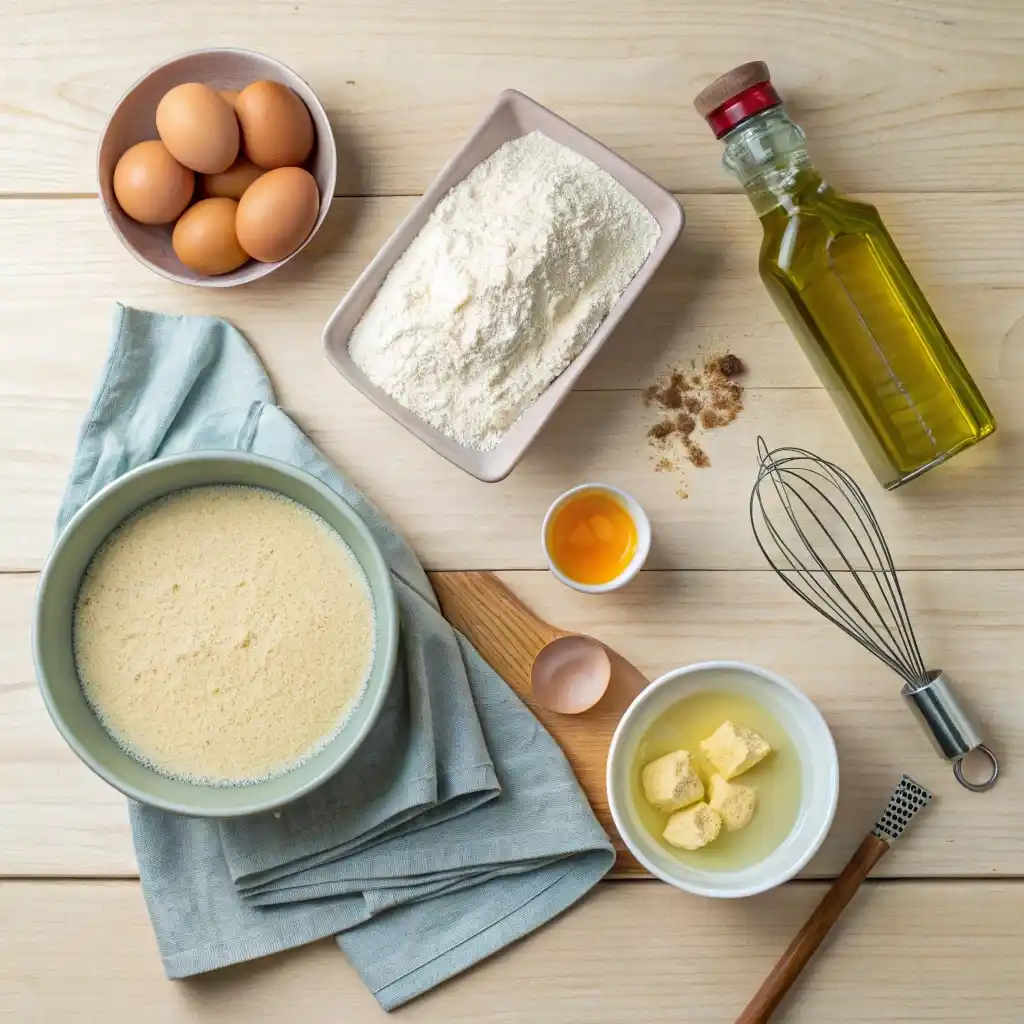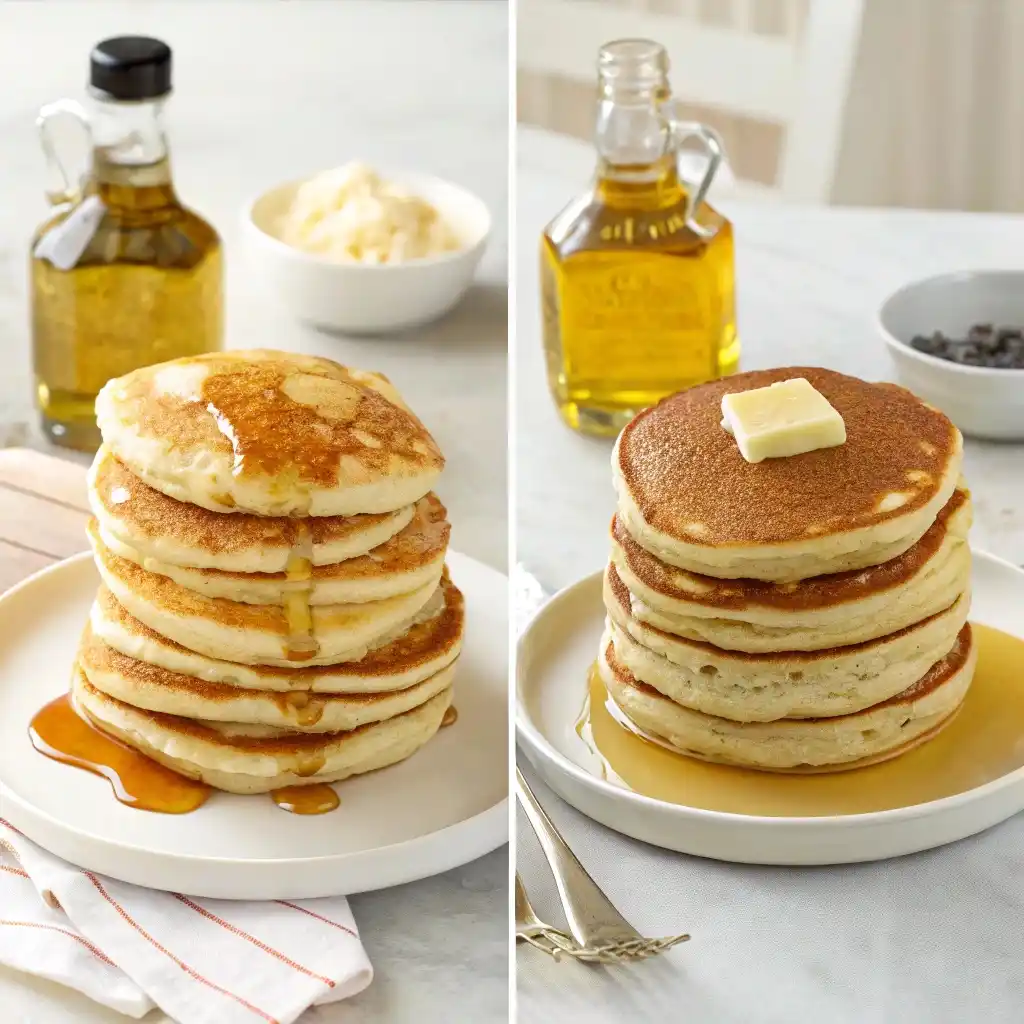Pancakes are a beloved breakfast staple, but the choice of fat—butter vs oil in pancakes-can significantly affect flavour, texture, and cooking ease. Butter is known for its rich flavour and ability to create a golden crust, while oil offers a neutral taste and convenience for high-heat cooking. Understanding the benefits of each can help you decide which is the best option for your perfect pancake stack.

The Science Behind Butter vs. Oil in Pancakes
How Butter vs. Oil in Pancakes Affects Texture and Flavor
- Texture: Fats help create a tender and moist pancake by preventing the gluten in the flour from overdeveloping.
- Flavour: Butter adds a rich, creamy flavour, while oil has a neutral profile, allowing other ingredients to shine.
Role in Preventing Sticking
Fats coat the pan, creating a non-stick surface that ensures pancakes cook evenly and release easily. Both butter and oil achieve this, but butter may require frequent reapplication due to its lower smoke point.
The Role of Butter in Butter vs. Oil in Pancakes Debate
Benefits of Using BuWhy Butter is a Popular Choice in Butter vs. Oil in Pancakestter
- Flavour: When melted and browned, butter imparts a rich, slightly nutty flavour, enhancing the overall taste of pancakes.
- Golden Crust: Butter’s milk solids, which caramelize during cooking, help achieve a beautifully browned exterior.
Types of Butter to Consider
- Unsalted Butter: Allows you to control the salt level in your batter.
- Salted Butter: Adds a hint of saltiness to balance the sweetness of pancakes.
- Clarified Butter: Ideal for cooking due to its higher smoke point, preventing burning.
The Role of Oil in Butter vs. Oil in Pancakes
Advantages of Choosing Oil in Butter vs. Oil in Pancakes
- Neutral Flavor: Oil doesn’t overpower the pancake’s flavour, making it ideal if you want the batter’s ingredients to shine.
- High Smoke Point: Oils like vegetables, canola, and grapeseed oil are less likely to burn, making them excellent for high-heat cooking.
- Moist Texture: Oil ensures consistent moisture throughout the pancake, preventing dryness.
Best Oils for Pancakes: Butter vs. Oil in Pancakes Comparison
- Vegetable Oil: Affordable and neutral in flavour, it’s a go-to pancake choice.
- Canola Oil: Another neutral option with a slightly lighter texture.
- Coconut Oil: Adds a subtle coconut flavour and is a popular choice for those seeking plant-based fat.
- Olive Oil: Offers a mild, fruity flavour, but it’s best suited for savoury pancakes or unique flavour profiles.
Can You Use Butter Instead of Oil for Pancakes?
Direct Substitution Methods
Yes, you can use butter instead of oil for pancakes, and the process is simple:
- 1:1 Substitution: Replace oil with equal melted butter in your pancake recipe.
- Adjust for Moisture: Butter contains water (about 15-20%), so your pancakes may be slightly softer than pure oil.
- Monitor Heat: Butter has a lower smoke point than most oils, so cook on medium heat to avoid burning.
This substitution is ideal when you want a richer, more flavorful pancake.
Nutritional Comparison: Butter vs. Oil
Calorie and Fat Content
- Butter: Contains about 100 calories and 12 grams of fat per tablespoon. It also includes saturated fats and trace amounts of vitamins like A and D.
- Oil: Vegetable or canola oil has about 120 calories and 14 grams of fat per tablespoon, but it contains mostly unsaturated fats, which are considered heart-healthy.
Health Considerations
- Butter: While it adds flavour, its saturated fat content may not suit individuals seeking low-fat options.
- Oil: Oils like canola or olive oil are better for those focusing on healthier fats and cholesterol levels.
For a balanced choice, consider the overall nutritional needs of your meal and your personal health goals.
Taste Test: Butter vs. Oil
Flavors Imparted by Butter
Butter provides a rich, slightly nutty flavour that enhances the taste of pancakes. The caramelization of its milk solids also contributes to a golden-brown crust.
Neutrality of Oil
Oil has a neutral flavour, allowing the natural sweetness of the batter or other ingredients (like fruit or syrup) to stand out. This makes it a versatile choice for most recipes, especially when the flavour of butter isn’t needed.
When to Choose Butter Over Oil
Recipes That Benefit from Butter’s Richness
- Buttermilk Pancakes: The tangy richness of buttermilk pairs beautifully with the creamy flavour of butter.
- Speciality Pancakes: Recipes like chocolate chip or banana pancakes benefit from butter’s enhanced flavour.
- Dessert Pancakes: Butter adds a decadent touch to sweet pancakes topped with whipped cream or syrup.
Times When Oil is More Convenient
- Cooking for a Crowd: Oil doesn’t require frequent reapplication, making it easier for large batches.
- Healthier Options: Oil’s unsaturated fats make it a better choice for lighter, everyday pancakes.
- High-Heat Cooking: Oil’s higher smoke point prevents burning, ensuring consistently cooked pancakes.
Tips for Substituting Butter for Oil
Measuring Equivalents
When substituting butter for oil in pancakes, the ratio is straightforward:
- 1:1 Ratio: Replace the amount of oil with equal melted butter. For instance, if the recipe calls for ¼ cup of oil, use ¼ cup of melted butter.
Adjusting for Moisture
Butter contains about 15–20% water, which can slightly alter the texture of pancakes:
- Add a Little Extra Butter: To compensate for the difference in fat content, add an extra teaspoon of melted butter for every ¼ cups.
- Monitor Batter Consistency: If the batter seems thinner than usual, reduce other liquid ingredients slightly.
Common Mistakes When Using Butter or Oil
Overheating Butter
- Butter has a low smoke point compared to most oils. Cooking pancakes on high heat can cause the butter to burn, leading to a bitter taste.
- Solution: Cook on medium heat and watch the pan to avoid scorching the butter.
Choosing the Wrong Type of Oil
- Some oils, like olive or coconut oil, have strong flavours that might overpower pancakes.
- Solution: Use neutral oils like canola, vegetable, or grapeseed if flavour neutrality is important.
Other Alternatives to Butter and Oil

Yoghurt
- How to Use: Replace half of the oil or butter with plain or Greek yoghurt.
- Effect on Pancakes: Yogurt adds moisture and a slight tang, creating tender pancakes with a subtle richness.
Applesauce
- How to Use: Replace up to half of the oil or butter with unsweetened applesauce.
- Effect on Pancakes: Pancakes become moist and slightly sweet, with fewer calories and less fat.
Mashed Bananas
- How to Use: Replace butter or oil with mashed bananas in a 1:1 ratio.
- Effect on Pancakes: Adds natural sweetness and a denser texture, ideal for fruity pancake recipes.
Nut Butters
- How to Use: Substitute part of the butter or oil with peanut, almond, or cashew butter.
- Effect on Pancakes: Nut butter adds protein and a rich, nutty flavour.
Regional Preferences for Pancake Fats
Traditional Methods Across Cultures
The choice of fat in pancake preparation often reflects local culinary traditions:
United States
- Butter: The quintessential choice for classic American pancakes, contributing to their rich, golden-brown finish.
- Vegetable Oil: A convenient and neutral alternative for large-scale cooking or lighter pancakes.
France
- Butter: French crêpes are traditionally made with butter, which adds richness and helps achieve their delicate, paper-thin texture.
- Clarified Butter: Often used for its higher smoke point, preventing burning during the crêpe-cooking process.
India
- Ghee: For making dosa or paratha-style pancakes, ghee adds a nutty flavour and enhances crispness.
Japan
- Neutral Oil: For fluffy soufflé pancakes, oils like canola or vegetables are preferred to avoid overpowering the batter’s sweetness.
Influence on Regional Pancake Styles
- Flavour Profiles: Butter imparts richness, while oils keep flavours neutral, allowing regional ingredients like fruits or spices to stand out.
- Cooking Techniques: Regions favour fats that align with traditional cookware (e.g., ghee for cast iron in India or butter for nonstick pans in the U.S.).
- Cultural Preferences: The choice of fat often complements local toppings, such as ghee-balancing savoury chutneys or butter-enhancing maple syrup.
FAQs About Butter and Oil in Pancakes
1. Can I use oil instead of butter in pancakes?
Yes, oil works as an excellent substitute for butter in pancake recipes. Its neutral flavour ensures it doesn’t overpower other ingredients’ taste, allowing the batter’s natural sweetness or added toppings to shine. Oil also contributes to moist pancakes because of its 100% fat content, which is slightly higher than butter due to butter’s water content (about 15–20%). However, one thing to note is that oil lacks the richness and depth of flavour that butter imparts. If you’re looking for convenience or a lighter fat profile, oil is a reliable option.
2. Which oil is best for pancakes?
The best pancake oil has a neutral flavour and a high smoke point. Popular choices include:
- Canola Oil: A neutral taste and light texture make it ideal for pancakes.
- Vegetable Oil: Affordable and widely available, this oil also provides a clean, unobtrusive flavour.
- Grapeseed Oil: A slightly more premium option with a neutral profile and a smooth finish.
Coconut oil can also be used for a subtle tropical twist, but its flavour may not suit all recipes. While a healthier option, olive oil has a strong flavour and is better suited for savoury pancake variations.
3. Is butter better than oil for pancakes?
The choice between butter and oil depends on your preferred flavour and cooking style. Butter adds a rich, creamy flavour that enhances the overall taste of pancakes. Its milk solids also promote a golden-brown crust, giving pancakes a classic diner-style appearance. However, butter has a lower smoke point, so it can burn at high temperatures, requiring careful monitoring during cooking. Oil, on the other hand, excels in convenience and versatility. It is less likely to burn, making it ideal for beginners or those cooking pancakes in large batches. Both have unique advantages, and your choice may vary depending on your desired result.
4. Can I mix butter and oil in pancakes?
Absolutely! Mixing butter and oil allows you to enjoy the best of both worlds. The butter contributes flavour and richness, while the oil provides a higher smoke point and stability during cooking. This combination ensures that your pancakes have a buttery taste without the risk of burning the fat in the pan. To use this method, mix butter with oil in a 1:1 ratio before adding it to your pan or batter.
5. Are there healthier options than butter or oil?
For those seeking lighter or healthier alternatives, yoghurt, applesauce, or mashed bananas work wonderfully in pancake recipes.
- Yoghurt: Adds moisture and a slight tang to pancakes while reducing fat content.
- Applesauce: Unsweetened applesauce provides natural sweetness and keeps pancakes soft.
- Mashed Bananas: Perfect for fruity pancakes, bananas add both sweetness and moisture.
These substitutes reduce fat and enhance the nutritional value of your pancakes by adding vitamins and fibre.
6. Does the type of fat affect the pancake’s texture?
Yes, the type of fat you use significantly impacts the texture of your pancakes. Butter creates tender and flavorful pancakes with a slightly denser texture, while its milk solids caramelize to form a golden crust. In contrast, oil produces lighter, fluffier pancakes with a smoother consistency. Oil-based pancakes often have a crispier exterior, especially when cooked at higher temperatures. Understanding how each fat influences the texture allows you to tailor your pancakes to your preferences.
Conclusion
Why Butter and Oil Both Have Their Place in Pancakes
Both butter and oil have unique benefits in pancake preparation. Butter offers rich flavour and a classic, indulgent taste, perfect for traditional recipes. On the other hand, oil provides convenience, neutrality, and versatility, making it an excellent choice for a wide range of pancake styles. Your choice ultimately depends on the flavour, texture, and health goals you want to achieve.
Want More Cooking Inspiration?
Is Maple Syrup Good for Pancakes? A Sweet and Savory Analysis

